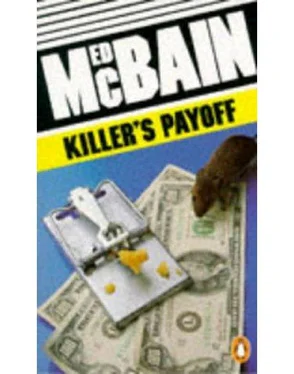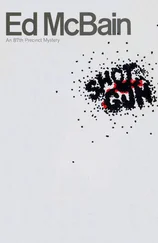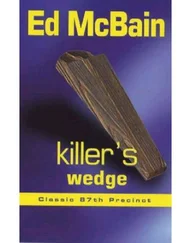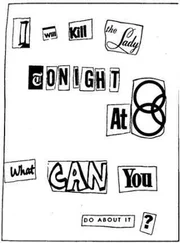McBain, Ed - Killer's Payoff
Здесь есть возможность читать онлайн «McBain, Ed - Killer's Payoff» весь текст электронной книги совершенно бесплатно (целиком полную версию без сокращений). В некоторых случаях можно слушать аудио, скачать через торрент в формате fb2 и присутствует краткое содержание. Жанр: Полицейский детектив, на английском языке. Описание произведения, (предисловие) а так же отзывы посетителей доступны на портале библиотеки ЛибКат.
- Название:Killer's Payoff
- Автор:
- Жанр:
- Год:неизвестен
- ISBN:нет данных
- Рейтинг книги:5 / 5. Голосов: 1
-
Избранное:Добавить в избранное
- Отзывы:
-
Ваша оценка:
- 100
- 1
- 2
- 3
- 4
- 5
Killer's Payoff: краткое содержание, описание и аннотация
Предлагаем к чтению аннотацию, описание, краткое содержание или предисловие (зависит от того, что написал сам автор книги «Killer's Payoff»). Если вы не нашли необходимую информацию о книге — напишите в комментариях, мы постараемся отыскать её.
Killer's Payoff — читать онлайн бесплатно полную книгу (весь текст) целиком
Ниже представлен текст книги, разбитый по страницам. Система сохранения места последней прочитанной страницы, позволяет с удобством читать онлайн бесплатно книгу «Killer's Payoff», без необходимости каждый раз заново искать на чём Вы остановились. Поставьте закладку, и сможете в любой момент перейти на страницу, на которой закончили чтение.
Интервал:
Закладка:
“Why’d you kill Kettering?” Hawes repeated.
Miller looked to Ruther for permission. Ruther nodded.
“It was an accident,” Miller said. “He was shot accidentally.”
“Who shot him?”
“We don’t know,” Miller said. “The three of us were hunting together. We spotted what we thought was a fox, and we all fired simultaneously. The fox turned out to be Kettering. We heard him scream. He was dead when we got to him. We didn’t know whose bullet had hit him.”
“It wasn’t mine,” Murphy said flatly.
“You don’t know that, John,” Ruther said.
“I do know it. I was shooting a .300 Savage, and you were both using twenty-twos. If my shot had hit him, it would have torn a—”
“You don’t know, John,” Ruther repeated.
“I do know, damnit. Kettering was killed by one of those twenty-twos.”
“Why didn’t you say so at the time?”
“I couldn’t think straight. You know that. None of us could.”
“What happened?” Hawes asked.
“We were in the middle of the woods with a dead man,” Miller said. His upper lip was beaded with perspiration now. Caught in the grip of total recall, his words came haltingly, with difficulty. “The woods were still; there wasn’t a sound. We were hardly breathing. Do you remember, Frank? Do you remember how quiet the woods went after Kettering’s scream?”
“Yes,” Ruther said. “Yes.”
“We stood around the body, the three of us, in those silent woods.”
And all at once, Hawes was there with them, standing over a man one of them had shot, standing over a dead man, with the woods gone suddenly still, as still as the man at their feet. And he realized, too, that the men were back there in the Adirondacks, playing out a scene they had lived, playing it with fresh emotion, as if it were happening to them for the first time.
“We didn’t know what to do,” Miller said.
“I wanted to report it to the authorities,” Murphy said.
“But how could we do that?” Ruther asked. “He was dead! Goddamnit, you knew he was dead.”
“But it was an accident.”
“What difference does that make? How many men get hanged because of accidents?”
“We should have reported it.”
“We couldn’t!” Miller said. “Suppose they didn’t believe us? Suppose they thought we shot him purposely?”
“They’d have believed us.”
“And even if they did,” Ruther said, “what would a scandal have done to my business?”
“And my job,” Miller said.
“Our pictures would have been in every tabloid. And there’d always be the doubt, and the knowledge that one of us had killed a man. How could we have lived with that?”
“We should have reported it,” Murphy insisted.
“We did the right thing,” Miller said. “No one had seen us. There was no one to know.”
“It wasn’t murder. We should have—”
“He was dead, damnit, dead! Did you want policemen and reporters barging in on your life? Did you want a living hell? Did you want everything you’d worked for ruined because of a goddamn senseless accident? If the man was dead, how were we harming him further? We knew he was single, we knew his only family was a sister he didn’t get along with. What else was there to do? Ruin our own lives because of a dead man? Take a chance that the law would be lenient? We did the right thing. We did the only thing. It was the only way.”
“I suppose,” Murphy said, and perhaps the argument in the woods had ended the same way, ended with the same false logic, the logic of three panic-stricken men faced with a problem that seemed to have but one solution.
“We buried him,” Miller said. “And then we released the brake on his car, locked the doors, and rolled it into the lake. We didn’t think anyone had seen us. We were sure we were alone in the woods.”
“You should have reported it,” Hawes said. “At worst, it was second-degree manslaughter, punishable by not more than fifteen years or a fine of one thousand dollars, or both. At best, it was excusable homicide. An accidental shooting. You might have got off scot-free.”
“There wasn’t time to consult a lawyer, Mr. Hawes,” Rather said. “There was only time for action, and we acted the way we thought best. I don’t know what you would have done.”
“I’d have reported it,” Hawes said.
“Perhaps. Perhaps not. It’s easy for you to coldly say you would have reported it. You were not standing there with the rifle in your hand, and the dead man at your feet—the way we were. Decisions are always easy to make from armchairs. We had a decision to make, and we had to make it fast. Have you ever killed a man, Mr. Hawes?”
“No,” Hawes said.
“Then don’t make statements about what you’d have done or not done. We did what seemed like the only thing to do at the time.”
“We thought it was murder, don’t you understand?” Miller said.
“I told you we should report it,” Murphy said. “I told you. No! You both insisted. Cowards! I shouldn’t have listened to cowards! I shouldn’t have listened to frightened men!”
“You’re in this, so shut up!” Miller snapped. “How could we have known we were being watched?”
“Kramer,” Hawes said.
“Yes,” Ruther answered. “Kramer, the bastard.”
“When did you get his ‘I SAW YOU!’ note?”
“The day we got back home.”
“What then?”
“He followed it with a phone call. We met him in Isola one day last September. He said he considered us equally guilty of murder. He had seen the shooting, seen the burial, and seen the disposal of Kettering’s car. And since he held us equally guilty and since, he said, we were equally guilty in the eyes of the law, he expected equal payments from each of us. He demanded thirty-six thousand dollars—twelve thousand from each of us.”
“That explains the buying spree in September. What then?”
“In October he came to us with another demand,” Ruther said. “He wanted an additional ten thousand from each of us, thirty thousand in all. He said that would be the last demand he would make. We couldn’t raise the money all at once, so he agreed to take it in two payments, one in October and the next in January. We raised twenty-one thousand in October, and we paid the remaining nine thousand in January.”
“We should have known,” Hawes said. “Every damn deposit in that bankbook was an odd number divisible by three. We should have realized. What about that April deposit? The fifteen-thousand-dollar one?”
“We didn’t hear from him all through the winter. We really began to believe his thirty-thousand-dollar demand was the last one,” Murphy said. “Then, in April, he called again. He wanted another fifteen thousand. He swore this would be the last payment. We raised the fifteen thousand.”
“Was it the last payment?”
“No,” Miller said. “If it had been, Kramer would still be alive. He called again in June, the beginning of June. He wanted another fifteen thousand. That was when we decided to kill him.”
“He was bleeding us!” Ruther shouted. “I’ve just begun to get my agency on its feet. I was pouring every damn cent I’d earned into Kramer’s bank account!”
“If homicide is ever considered justifiable,” Miller said, “the murder of Sy Kramer was justifiable.”
Hawes did not comment. “How’d you do it?” he asked.
“Where’s that breakfast?” Ruther wanted to know.
“It’ll be here. Tell me how you got Kramer.”
“We followed him for a month,” Murphy said. “We took shifts. We worked out a timetable. We knew exactly where he went at what hours. We knew his life better than he did.”
“We had to,” Ruther explained. “We were planning to take it from him.”
Читать дальшеИнтервал:
Закладка:
Похожие книги на «Killer's Payoff»
Представляем Вашему вниманию похожие книги на «Killer's Payoff» списком для выбора. Мы отобрали схожую по названию и смыслу литературу в надежде предоставить читателям больше вариантов отыскать новые, интересные, ещё непрочитанные произведения.
Обсуждение, отзывы о книге «Killer's Payoff» и просто собственные мнения читателей. Оставьте ваши комментарии, напишите, что Вы думаете о произведении, его смысле или главных героях. Укажите что конкретно понравилось, а что нет, и почему Вы так считаете.












